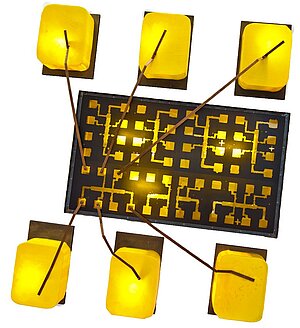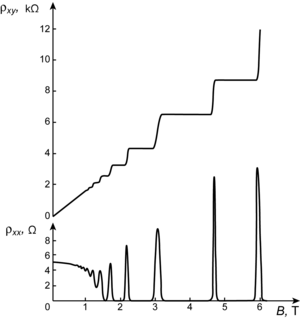Klaus von Klitzing
* 28. June 1943 in Środa Wielkopolska (Poland)
1962 Study of Physics at the Technical University of Braunschweig
1969 Diploma in Physics under F. R. Kessler
Transition to the Julius-Maximilians-Universität Würzburg
1972 Conferral of a doctorate
1978 Habilitation
1980 Professorship at the Technical University of Munich
1985 Director at the Max Planck Institute for Solid State Research
Honorary Professor at the University in Stuttgart
Nobel Prize in Physics
The Universitätsarchiv Würzburg wants to take the opportunity of the June, to present the famous Physician Klaus von Klitzing as the Scholar of the month, on the occasion of his 75. Birthday. In 1985 he was awarded with the Nobel Prize in Physics for his research on the quantum Hall effect.
Career of an outstanding physician
Klaus von Klitzing, who is descended from a noble family of the Mittelmark, achieved his A-Levels in February 1962 at the Artland-Gymnasium Quakenbrück and afterwards began his promising academic career with studying Physics at the Technical University of Braunschweig. In 1969 he finished his study with a diploma and subsequently went to the Julius-Maximilians-Universität Würzburg, where he received his conferral of a doctorate in 1972 with his thesis entitled Galvanomagnetic Properties of Tellurium in Strong Magnetic Fields, followed by his habilitation in 1978. In 1980 he was appealed by the Technical University of Munich and stayed there until his affiliation into the directors council of the Max Planck Institute for Solid State Research in Stuttgart. Klaus von Klitzing is still doing research in Stuttgart to date.
Nobel-Prize-worthy breakthrough: the quantum Hall effect
To expedite his research, the physician made multiple research stays in the UK, France and the USA, with his perhaps most important one being the one from 1979 to 1980 at the Grenoble High Magnetic Field Laboratory, where he made his key discovery on the 5th of February 1980 at 2 am: He succeeded in precisely measuring the quantum Hall effect. The effect describes the stepwise alteration of the Hall voltage under certain conditions, with an increase of the magnetic field strength, which is dependent on two natural constants (elementary charge and Planck constant). The interval between the steps could from now on be elegantly specified with the help of the von Klitzing constant. With his discovery, von Klitzing initiated a new scientific field, which is of great importance until today. That is why he was justifiably awarded the Nobel Prize in Physics in 1985. The quantum Hall-effect is so precise, that in 2019 a new unit-system based on natural constants will be introduced.
Commitment and enthusiasm
Besides the Nobel Prize, von Klitzing holds several additional Prices (with the Richard E. Prange Prize 2014 being the latest) as well as honorary degrees at Universities in nine countries. Moreover he is a member in multiple national and international academies, like the Deutsche Akademie der Naturforscher Leopoldina and the National Academy of Sciences of the United States of America. Von Klitzing is a passionate scientist, who is committed to promote the enthusiasm about scientific disciplines. He is also the eponym and member of the selection committee of the Klaus-von-Klitzing-Prize for committed teachers of natural science, which is awarded since 2005.
Recommended Readings:
v. Klitzing, Klaus / Dorda, Gerhard / Pepper, Michael: New Method for High-Accuracy Determination of the Fine-Structure Constant Based on Quantized Hall Resistance, in: Physical Review Letters 45 (1980), p. 494-497.
v. Klitzing, Klaus: Quantum Hall Effect: Discovery and Application, in:
Annual Review of Condensed Matter Physics 8 (2017), p. 13-30.
Scharf, Rainer: Ausgezeichnete Physik. Der Nobelpreis und die Geschichte einer Wissenschaft, Regensburg 2012.




